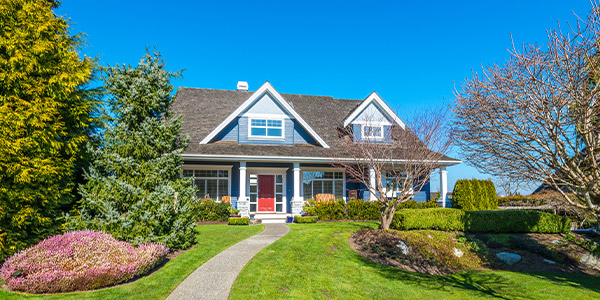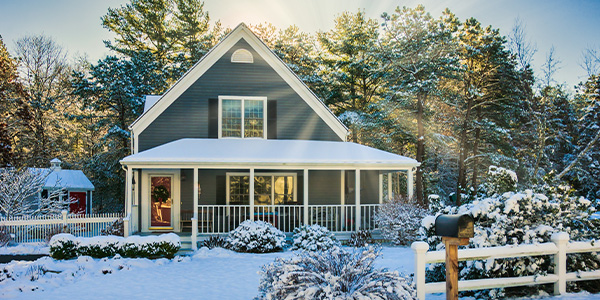Homebuyers
What Are the Types of Fixed-Rate Mortgages?
December 13, 2021
When it comes to buying a house or refinancing your existing mortgage, one of the most important decisions you will make will be what type of loan to get. There are quite a few options and different loan types, but the most popular choice is a fixed-rate mortgage.
What is a Fixed-Rate Mortgage?
A fixed-rate mortgage is just what it sounds like. Your interest rate is fixed and doesn't change for the entire life of your loan. Fixed-rate mortgages are a preferred choice for many borrowers as they ensure that their principal and interest payments will remain the same each month for as long as 30 years.
However, there are different types of fixed-rate mortgages. Specifically, different loan terms may be available for you.
What are the Different Types of Fixed-Rate Mortgages?
The two most prevalent fixed-rate mortgages are the 30-year fixed-rate mortgage, where the loan is paid off after 30 years, and the 15-year fixed-rate mortgage, which lasts 15 years. Each loan has its advantages. Let's explore the differences between the two main types of fixed-rate mortgages.
30-Year Fixed-Rate Mortgage
A 30-year fixed-rate mortgage is a home loan that is repaid over 30 years. The interest rate is stable for the entire life of the loan, meaning it will not change for 30 years. The 30-year fixed-rate mortgage is the most popular as it provides lower payments since the repayment amount is spread out (amortized) over 30 years.
The 30-year fixed-rate mortgage also provides payment stability. This makes it easier to budget as the monthly payments stay at a fixed rate over 30 years regardless of market conditions. Many homebuyers favor this option for the long-term security it provides.
15-Year Fixed-Rate Mortgage
As its name states, a 15-year fixed-rate mortgage is paid back over 15 years, half the time of the 30-year option. The 15-year fixed-rate mortgage is an attractive option for many borrowers as it typically has a lower interest rate than its 30-year counterpart. The 15-year term also allows borrowers to build equity in their homes more quickly since they would be paying less in interest over the life of the loan.
Like the 30-year mortgage, a 15-year loan carries payment stability, but since the loan term is shorter, the payment will likely be higher than if it was paid back over 30 years. For certain borrowers, the 15-year mortgage is a solid option.
What are the Other Loan Options?
Beyond the term of the loan, borrowers also have options when it comes to the type of loan they get. These options include Conventional Loans, FHA Loans, and VA Loans.
Conventional Loan
A conventional loan is not insured or guaranteed by the government, which means it brings fewer restrictions and allows lenders some flexibility specific to their borrowers. Conventional loans typically require a down payment of as little as 3% of the total cost of the home. Additionally, the time to process the loan may be faster than government-backed loans. Lenders can offer flexible term lengths on conventional loans, ranging from 10 to 30 years. Since lenders are at a higher risk with a conventional loan, the borrower may be required to secure private mortgage insurance (PMI) if they have a down payment of less than 20%. PMI will no longer be required once a borrower reaches 20% equity in the home.
FHA Loan
An FHA loan is a mortgage insured by the Federal Housing Administration (FHA), a federal government agency that is part of the Department of Housing and Urban Development (HUD). FHA loans are backed by the federal government and are often a viable option for home buyers who do not qualify for a Conventional loan. FHA loan requirements vary depending on individual loan types but require as little as a 3.5% down payment on a home loan purchase.
FHA loans may be a good option for first-time homebuyers, buyers with a lower credit score, or challenging credit history. One thing to consider: FHA loans require both an upfront payment for mortgage insurance and separate monthly mortgage insurance payments for as long as the life of the loan, depending on the loan-to-value ratio.
FHA loans also have loan limits that are set at the beginning of each year and vary by county.
VA Loan
A VA loan is a mortgage guaranteed by the Department of Veterans Affairs. VA loans are exclusively for active duty military personnel, Veteran service members, and certain military spouses. VA loans carry significant benefits for those who qualify, including lower interest rates, no required down payment, and no monthly mortgage insurance premiums.
There are many options when it comes to figuring out which mortgage makes the most sense for you. Request a quote through our website or contact a New American Funding loan officer to find out which loan is the right one for you.






 Smart Moves Start Here.
Smart Moves Start Here.